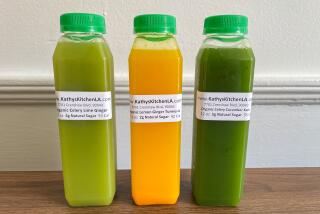Juice Makers Just Want a Healthy Profit : Beverages: Bay Area’s Odwalla doubles earnings and gets Wall Street’s attention with fresh products and its ‘people to planet’ philosophy.
- Share via
SOUTH SAN FRANCISCO — It’s called Odwalla-speak.
The company’s vision is not profits but an organization that operates “people to planet.”
Fresh juice--26 different choices, in fact--nourishes “the body whole.”
Each year, the Davenport, Calif., firm also conducts its own “eco-audit” to check, among other things, how well it recycles its own plastic containers.
If you think all this sounds like it began with a couple of musicians driving around Santa Cruz in a Volkswagen bus, help yourself to a tangerine juice.
“Our culture is our message,” said Stephen Williamson, co-chief executive officer, at the company’s distribution center here.
Williamson joined Odwalla in 1991, when the juice maker was struggling to squeeze out a place for itself in the $9-billion fruit beverage market.
The company was founded in 1980 by Greg Steltenpohl and Gerry Percy, childhood friends who started in a back-yard shed with a $250 juicing machine and several boxes of oranges.
They used whatever money they made to fund jazz programs. The name Odwalla comes from a song in which an Indian chief leads the “lost people of the sun” out of the “gray haze.”
But the company hit its own dark period four years ago when it tried to scale up production to meet growing market demand.
A series of poor management decisions, a cash crisis and acts of nature such as a deep freeze in California left the firm in precarious financial shape.
Still, investors such as Williamson were convinced the company had the right idea.
Odwalla’s juice comes with no preservatives and isn’t boiled to extend shelf life. That means workers, known as “juiceheads,” have about two weeks to process, ship and sell the highly perishable product before it expires.
A key piece of the turnaround came in 1993 when the company opened a 65,000-square-foot manufacturing plant in Dinuba. That solved a major production bottleneck.
It also gave Wall Street underwriters enough confidence to float an initial public stock offering of 700,000 shares later that same year.
Odwalla has since used some of that cash to expand through acquisitions into the Denver and Seattle markets. A second stock offering was held earlier this year.
So far, the plan appears to be working.
Profits for the third quarter ended May 31 are up 100% from the previous year. Sales have gone from $12.5 million in 1993 to a projected $34 million this year.
That kind of growth has created some lofty expectations.
Odwalla’s stock at $21 a share on the Nasdaq exchange is selling at an estimated 84 times earnings of 25 cents per share for the current fiscal year.
The firm is even being compared to Snapple, which made a splash in the non-carbonated juice market before being bought by Quaker Oats.
To try and smooth growth, Odwalla has reduced its dependence on fresh-squeezed orange juice, which has gone from 65% of the company’s sales four years ago to 25% today.
“They are a unique company in regard to what they are doing,” said Robert Kruger, a market analyst who tracks Odwalla for Van Kasper & Co. in San Francisco.
“One by one they are entering new markets,” he said. “If their success in the Northern California market can be duplicated in Seattle and Denver . . . they have an unbelievable outlook going forward.”
More to Read
Inside the business of entertainment
The Wide Shot brings you news, analysis and insights on everything from streaming wars to production — and what it all means for the future.
You may occasionally receive promotional content from the Los Angeles Times.








